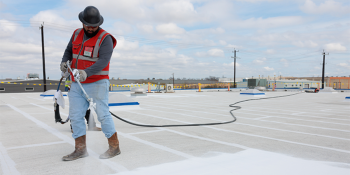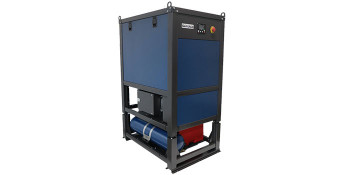Q&A Forums
Allergic reaction to Demilec spray insulation Post New Topic | Post Reply
| Author | Comments |
|---|---|
|
James Dunn
Posted: Feb 21, 2008 10:06 PM
|
Allergic reaction to Demilec spray insulation
I had a severe reaction to the Demilec insulation that was sprayed into our attic and cathedral ceiling in July. Symptoms were eye and throat irritation, numbness, weakness and hair loss. I had to move out of the house until all insulation was removed. Has anyone else heard of such a problem? jrd |
|
SprayFoamSupply.com
Posted: Feb 22, 2008 12:35 AM
|
Were you in the house while the foam was being sprayed? Have you ever worked in the plastics industry? George |
|
mason
Posted: Feb 22, 2008 08:09 AM
|
The chemicals in any sprayfoam can cause throat and eye irritation if you are in the area while they are spraying, But numbness, loss of hair, weakness, nope. Fully cured sprayfoam should not emit fumes or chemicals into the air that would be considered hazardous to your health. If the foam had even an odor after more than a few days, I suspect it was not sprayed on ratio. |
|
Posted: Feb 23, 2008 08:38 PM
|
are you allergic to other plastics? did you recieve a medical diagnosis? were you known chemically sensitive before the application? not nessesarily foam but immune depressed or chemically sensitive(you know what i mean if you are) were there any other possible elements of your aparrent construction process that could contribute to or cause the symptoms,,how do you know it is the foam...??? do you have a previous history of neurologic or psychiatric illness? indeed exposure at the time of application can cause the eye and throat irritation,,but once manufactured foam plastics are of the thermal set family of plastics so there should be no degradation of the product over time,,,nor should it offgass voc's or other compounds... this is facinating,,,please let us know how this goes for you..... $$$$$ |
|
Tim O'Keefe
Posted: Feb 23, 2008 09:00 PM
|
Have you been living in the house for the last 6 months? How did you (or a medical professional) come to the conclusion that the foam was the cause? Those symptoms could be caused by hundreds of things. Numbness and weakness are neurological symptoms not directly related to hair loss, and the otolaryngological symptoms are generally due to exposure to an irritant also not directly related to neurological symptoms. I am very curious to hear about the medical relevance to all of this! Tim Granite State Spray Foam Co. |
|
James Dunn
Posted: Feb 24, 2008 10:55 PM
|
To answer some of your questions: I was in the attic when the insulation was being sprayed for about 5 min. at a time for a total of 15 min. I have had Lyme disease, now in remission, which may indicate a weakened immune system. I am sensitive to some petroleum products as lawnmower fumes (headaches). I am 66 but still very active physically and was feeling well until the day the insulation was sprayed. Symptoms then began with a tingling in the left hand and then the left leg, vision became "foggy," heart rate increased, and hair loss was evident by September. I realized that my health was being jeopardized by the exposure and had to move out of the house. Even sleeping in the camper van near the house was not possible because the "toxins" surrounded the house unless there was wind. Because I am a college teacher, I was able to sleep in the dorm for over 2 weeks and then moved the camper to a neighbor's driveway at night. We realized that we would have to move or remove the insulation. My wife, with some help, scraped it out of the attic and by November a contractor removed the cathedral ceiling and took out the remainder. Since then I have recovered, including hair. I realize that this experience is certainly not common, but I hope it is a caution to installers to protect themselves and to ask customers before installation if they have any sensitivities. jrd |
|
mason
Posted: Feb 26, 2008 09:23 AM
|
Cured polyurethane foam is relatively inert and has not been known to release toxic chemicals. However, during application fumes and mists are released that can be harmful to your health. But as I mentioned before, outside of the eye and throat irritation, your other symptoms do not match known adverse reations from SPF applications. |
|
James Dunn
Posted: Feb 27, 2008 10:25 AM
|
One last comment about my reaction to Demilec spray foam: a very complete description of the product is at this site (http://www.twinsulation.com/pdf/MSDS-A-Sealection500%20.pdf). The section on Potential health effects - inhalation is a possible explanation of why, because of my supersensitivity, I was not able to be in or very close to the house. Thanks for your input as I have attempted to understand how this product had affected me. jrd |
|
Posted: Feb 28, 2008 05:39 AM
|
this is a difficult situation,, i am not trying to "blame you" but,,you should have addressed your known chemical sensivity to your contractor,,,particularly sensitivity to petroleum based products,,, i would have sent you home with a bun of foam told you to put it in a pillow case and put it in your bedroom next to your bed,,,your problems would probably have manifested themself with this "acid-test"..did you know that this is how the American Lung Association gave their "approval" to the big Icy foam years back for the healthy house or what ever...yep the dude slept on the foam,,was a chemically sensive fella,,and had no reaction...so the deemed the stuff the greatest since sliced filterglass... good luck with your illness,,indeed a shame the foam would not work in your home, the energy you would have saved would have been substantial,,rewarding you and our world with savings, comfort and reduced carbon footprint... peace dude |
|
mason
Posted: Feb 29, 2008 01:25 PM
|
I want to be sure that you understand that a cured foam product has completely different properties than the liquid components. The MSDS sheets of a foam are based on the liquid components before they are mixed. After they are mixed then different tests are used to determine their relative safety and "toxic" emissions. Demilec and other foams sold in Canada must pass a test for VOC emissions in accordance with a specific protocal. If you have chemical sensitivities then the fumes and mists created during the application would probably affect you. But, again after the foam is cured, within a matter of hours or days, the levels of chemical emissions should be at the non-detectable levels. A question, are you allergic to seat cushions & dash boards in cars, pillows, mattresses couches, carpet padding, etc? All of these products contain the many of the same polyurethane raw materials as rigid polyurethane foam. |
|
philip mullins
Posted: Mar 01, 2008 10:37 PM
|
ok. i have been watching this thread and keeping my mouth shut (ur welcome mace,lol). but i gotta say it. judging by the type of questions, or lack there of, posted by the author, i am a bit sceptical. if it were me i would be asking if this or that made since, or has ever been heard of, or how do i...etc. if cured foam has this affect, then so do many other things. if cured foam could make ur hair fall out then drinking coffee from a foam cup would kill you, right. and if this is the case you would have had to have known. and to then have foam insulation installed in your home would have been well, lets call it a very poor decision. i dont want to jump to conclusions but, has someone at demilac angered you recently? or could these symptoms be from a rather large investment in the fiberglass insulation industry. it just seems odd to me that you dont ask for any info that would help to prove ur claim or that would help you in the process of treatment. you have simply stated that foam made you sick. in a very popular forum where peeps come to learn more about foam? |
|
mason
Posted: Mar 02, 2008 09:09 AM
|
A couple of folks have emailed me asking to remove this post or at least the mention of Demilec. I believe this post has value to both the consumer and the SPF industry. This issue is not related to a specific supplier like Demilec but to all SPF suppliers and contractors. Be sure your customers know the safety and health risks of the foam during application and also the relative inert characteristics of the cured foam after application. Your supplier can provide tons of information relating to the safe use of SPF. Additional information is available from both the Spray Polyurethane Foam Alliance (sprayfoam.or) and the Center for the Polyurethanes Industry (polyurethane.org) |
|
David Kang
Posted: Mar 11, 2008 05:45 PM
|
Actually, the reaction described is an allergic reaction not to Demilec but to amine inhalation. Under the spray, probably in the attic with no floor boards. This is a prime example of why no one should be around without a mask when spraying takes place. I have seen this only twice before, in many years, but it does exist. The hair loss is suspect as this is caused by poisoning rather than a slight exposure, and you would have to be inhaling the fumes non-stop for quite some time to get that much exposure. Unfortunate for Demilec that it was their foam being sprayed, but it can happen to all of us. It is rare, but it can happen. The moral....keep people without proper protection away from the spray area. |





























